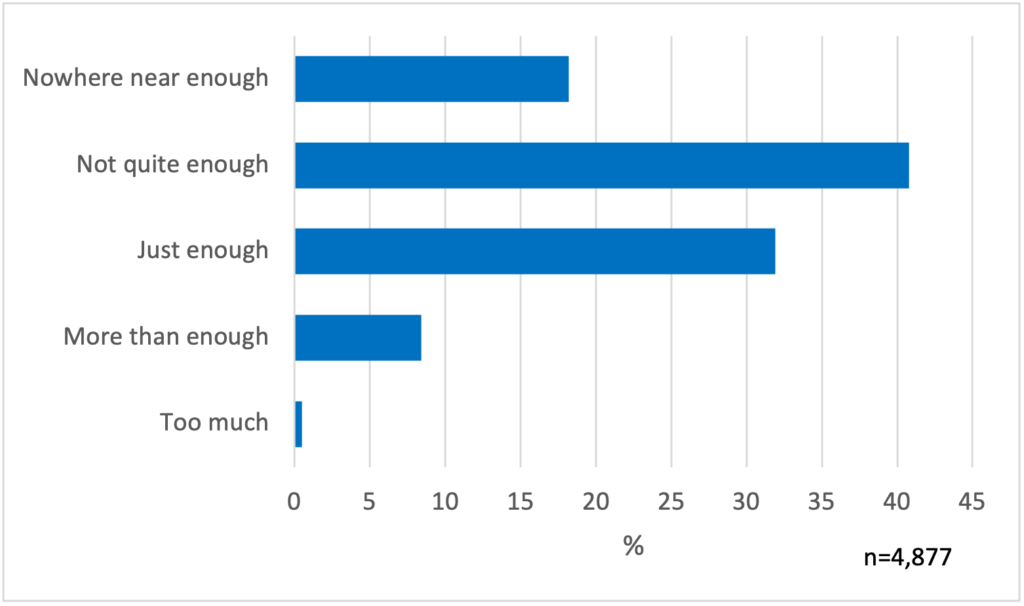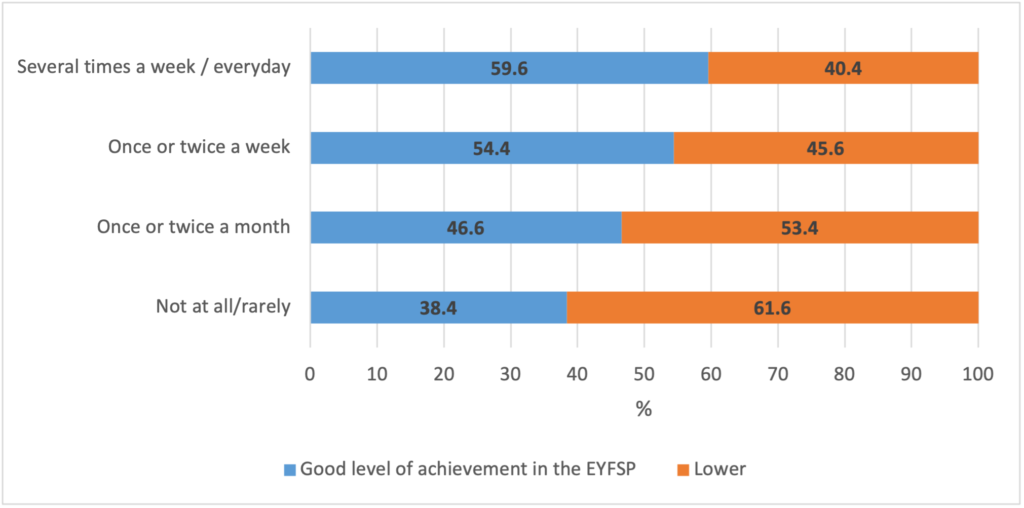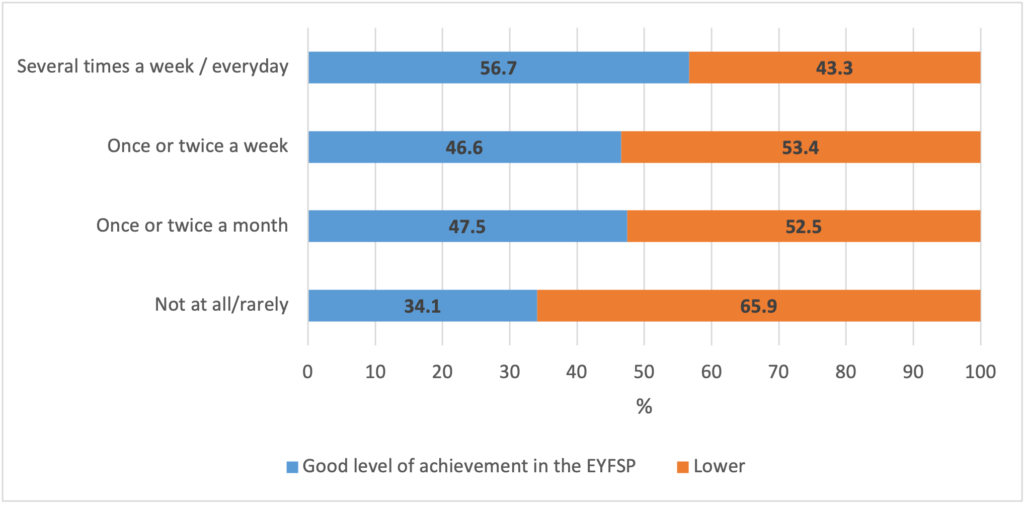
By Dr Helen Norman, Dr Jeremy Davies and Dr Rose Smith
Fathers now spend more time on childcare than their own fathers did, but three-fifths (59%) feel they do not spend enough time with their children – and this may be impacting negatively on their children’s learning.
Our analysis of almost 5,000 two parent households from the UK’s Millennium Cohort Study (footnote 1) found that almost a fifth (18%) of dads felt the time they spent with their five-year-old was ‘nowhere near enough’. Another two-fifths (41%) felt their time together was ‘not quite enough’ (see Graph 1 below).
We wanted to find out whether there was a relationship between the amount of time fathers felt they had with their five-year-old, and their child’s overall achievement in the Early Years Foundation Stage Profile (EYFSP) at age five.
What we found
Using logistic regression analysis (a statistical method for exploring the relationship between different variables), we found that the odds of children reaching a good level of overall achievement in the EYFSP (footnote 2) reduced by 18% if the father said he spent ‘nowhere near enough time’ with his child.
This was the case even when we accounted for other factors that might affect the child’s attainment. These included the child’s age in the school year, their gender, ethnicity, household income, whether they had been to pre-school formal childcare and their parents’ employment status. In contrast, the mother’s feelings about time spent with her child had no significant effect.
This suggests that time spent with fathers is important, but we note that this is not the only thing that affects how well a child does at school. For example, socio-economic status, peer relationships and quality of teaching are likely to be important too. We want to find out whether fathers’ involvement might interact with or change some of these other influences.
The effect of long working hours
Several factors can affect fathers’ time spent with children – like the demands of their job, their partner’s employment status, whether they have access to formal childcare and their own parenting attitudes and beliefs (see Norman et al. 2014; Fagan and Norman 2016; Hardy et al. 2022 for more details).
Our analysis with the MCS found that work hours are important. A quarter of dads (24.7%) who worked long full-time hours (45+ per week) said they spent ‘nowhere near enough time’ with their five-year-old, compared to 17% of dads who worked standard full-time hours (30-45 per week).
Graph 1. How do fathers feel about the amount of time they spend with their child (aged 5)?

Source: Sweep 3 (2006) of the MCS – when cohort children are aged five. The sample comprises 4,966 two (opposite sex) parent households in England. Ten dads who answered ‘not sure’ and 79 dads who did not provide a response to the question are excluded from the Figure. Data is weighted to account for the stratified sampling design and non-response.
Exploring what dads do with the time they have
So far, we have considered how fathers feel about the time they spend with their children, but what about what fathers actually do with their children – does this have any effect?
As our study progresses, we will explore whether and how fathers’ childcare involvement affects their children’s educational attainment in more depth. We have developed robust measures of fathers’ (and mothers’) involvement in childcare activities, so we can look further at the relationship between parental involvement and children’s educational attainment at age five.
We will also look at attainment at ages seven and eleven, by linking the data to the official educational records of children in the National Pupil Database. As well as establishing whether and how fathers have an impact, we will consider whether this is more important for boys or girls – or at certain stages of the child’s life.
We want to look at this because we know that inequalities in attainment start from an early age. We know that among children surveyed in our sample of the Millennium Cohort Study, more than three-fifths (62.4%) of girls reached a good level of achievement in the EYFSP compared to less than half (46.8%) of boys. Just 39% of children from poorer households (footnote 3) reached a good level of achievement compared to 57.5% of children from more affluent households.
Could fathers’ involvement at home help to alleviate some of these gendered and socio-economic effects?
Dads and reading
In our initial explorations of the MCS, we found that a higher proportion of children reached a good level of overall achievement in the EYFSP when dads engaged regularly in activities such as drawing and painting, playing games and reading with their children.
For example, as Graph 2 shows, three-fifths (60%) of children whose dads read to them regularly (i.e. several times a week or more) reached a good level of overall achievement in the EYFSP, compared to just two-fifths (38%) of children whose dads rarely did this. It is clear that the proportion of children reaching a good level of EYFSP achievement falls as the frequency of fathers’ reading with them reduces.
The pattern is similar for mothers, although the proportion of children reaching a good level of EYFSP achievement if the mother reads to them regularly (57%) is slightly lower (see Graph 3).
This suggests that both parents’ involvement is important. In our ongoing analysis we aim to explore, in more detail, the different ways fathers and mothers may affect their children’s overall achievement, and how this varies according to socio-demographics and children’s own characteristics.
Graph 2: The proportion of children who achieved a good level of achievement, or lower, in the EYFSP – according to how often fathers read to them at home

Graph 3: The proportion of children who achieved a good level of achievement, or lower, in the EYFSP – according to how often mothers read to them at home

Would you like to take part in the PIECE Talks – a series of think-ins where we’ll explore issues raised in this blog, and our wider study? Click here for more details.
Footnotes
- We analysed data from the first three sweeps of the Millennium Cohort Study – a nationally representative survey that follows the lives of children born in 2000-01.
- The EYFSP captures the ‘Early Learning Goals’ as a set of 13 assessment scales including, for example, disposition and attitudes, emotional development, reading, writing and knowledge and understanding about the world. The Department for Education defines a Good Level of Achievement as a score of ≥78 points in the total EYFSP score (which ranges from 0-117) but this must include a score of ≥6 in each individual scale under Personal, social and emotional development and Communication, language and literacy (for more detail see the EYFSP handbook).
- Families whose equivalised income was 60% below the UK median, before housing costs, were defined as being poverty (Ketende & Joshi, 2008).
References
Norman H, Elliot M, Fagan C. 2014. Which fathers are the most involved in taking care of their toddlers in the UK? An investigation of the predictors of paternal involvement. Community, Work & Family. 17(2), pp. 163-180
Fagan C, Norman H. 2016. Which Fathers Are Involved in Caring for Pre-school Age Children in the United Kingdom? A Longitudinal Analysis of the Influence of Work Hours in Employment on Shared Childcare Arrangements in Couple Households. In: Ruspini E; Crespi I (eds.) Balancing Work and Family in a Changing Society: The Fathers’ Perspective. Global Masculinities. Palgrave Macmillan, pp. 83-98
Hardy, K. Tomlinson, J., Norman, H., Cruz, K, Whittaker, X., Archer, N. (2022) ‘Essential but undervalued: early years care & education during COVID-19’, Final Report, Childcare During Covid: University of Leeds
Ketende, S, Joshi, H (2008). Income and poverty. In Millennium Cohort Study, Third Survey: a User’s Guide to Initial Findings (ed. Hasan, K. and Joshi, H.). Centre for Longitudinal Studies: London.





